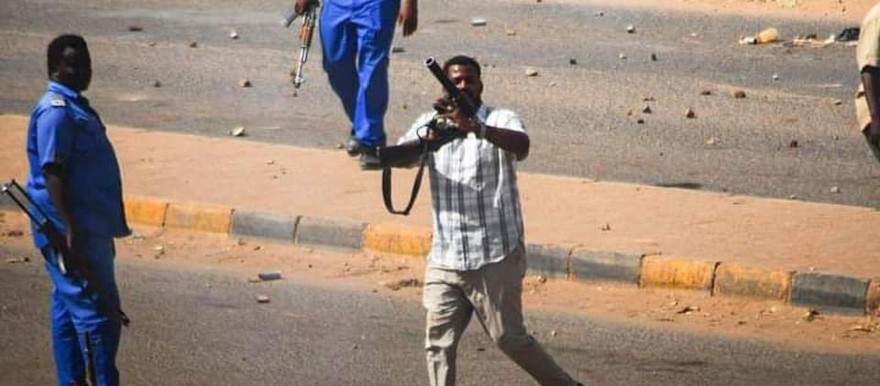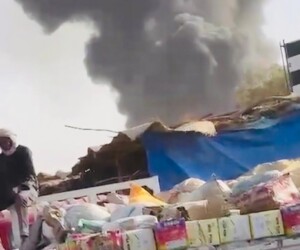Sudan police ‘still controlled by beliefs and behaviour of former regime’

Armed policemen assisted by armed men in civilian clothes, believed to be undercover members of security forces, during demonstrations in November (social media)
The use of violence against protesters continues “as in former years”, retired Police Lt Col El Tayeb Osman El Samani told Radio Dabanga and explained that “the police are still controlled by beliefs and behaviour inherited from the former regime,” posing a challenge to meaningful reforms.
In an interview with Radio Dabanga, retired officer El Samani said that the police are still controlled by beliefs and behaviour inherited from the former regime of dictator Omar Al Bashir (198-2019).
“The use of force and violence against demonstrators continues as in former years,” he said but explained that “rapid procedural interventions will solve a large part of the problems”.
Security and military reform is one of the five outstanding ‘thorny’ issues that have to be agreed on with the military junta in the Final Agreement in order to start a new transitional period governed by a civilian government.
The challenge in reforming Sudan’s security forces lies in identifying the elements in need of reform by names and in returning honourable officers to the army, police, and other security forces, explained El Samani, who is also a member of the suspended Empowerment Removal Committee*.
The retired police officer called on legal agents to base their prosecution on charging the force members present at the time of a violation, and if they failed to determine their responsibility, the police chief would be held responsible to reach the higher authorities, including Lt Gen Abdelfattah El Burhan or Gen Mohamed ‘Hemeti’ Dagalo.
The former is Commander-in-Chief of the Sudan Armed Forces (SAF) and Chairman of Sudan’s sovereignty council whilst the latter is Commander-in-Chief of the Rapid Support Forces (RSF) and Vice-Chairman of the council.
El Samani said that the desire and will of the decision-makers (authorities) in Sudan should be the right first step towards reforming the security system.
El Burhan, nevertheless, defended police performances despite continued violations in a speech in November and considered the critical movement against police violence as ‘enemies’ targeting Sudan.
Nafeesa Hajar, member of the Emergency Lawyers and Vice President of the Darfur Bar Association (DBA), told Radio Dabanga that El Burhan’s defence of the police can be considered “a directive to these agencies to continue violating the law”.

Violence as hobby
At a press conference in Khartoum in early December 1 last year, held by Emergency Lawyers on the excessive violence used by security forces against demonstrators, El Samani accused policemen of using their weapons with “much pleasure, as if they are practicing their hobbies”.
He said that the law obliges the police to use the tear gas launchers at an angle of 45 degrees and at a distance of 90 meters from crowds.
“The police now have turned the projectiles into a deadly weapon by using the launchers horizontally, at straight angles to their bodies, and from a close distance from within the crowds, which leads to the death or serious injuries of demonstrators,” he explained.
“Armoured vehicles of the security forces are equipped with similar launchers,” and are also frequently used to drive over protesters.
Alaa Nugud, a member of the United Doctors’ Office, said at the same press conference that the riot police shoot with stones, or even glass, in tear gas launchers because of the low economic cost.
“Shooting with stones […] is an immoral practice. It has led to the death of two demonstrators and the loss of the eyes of three others so far.”
Last month, the Sudanese Doctors Association also recorded the use of harmful chemicals in water cannons used by police and tear gas cannisters filled with stones or glass, breaking international law.
Injuries by stones were again reported during marches at the end of last month.
Since the October 2021 coup, at least 122 protesters have been killed and more than 7,000 protesters were injured between October 2021 and August 2022 alone.
* The full name of the committee is the Committee for Dismantling the June 30 1989 Regime, Removal of Empowerment and Corruption, and Recovering Public Funds. It was established by the government of Abdallah Hamdok at the end of 2019 with the aim to purge Sudan of the remnants of the Al Bashir regime. Empowerment (tamkin) is the term with which the ousted government of Omar Al Bashir supported its affiliates by granting them far-going privileges, including government functions, the setting-up of various companies, and tax exemptions. Many ERC members were arrested after the 2021 military coup and the committee was disbanded.











 and then
and then